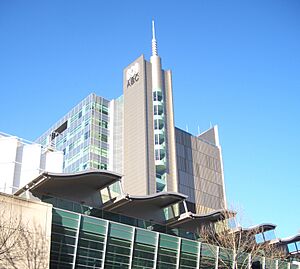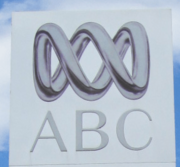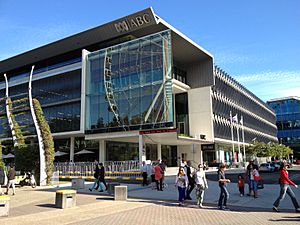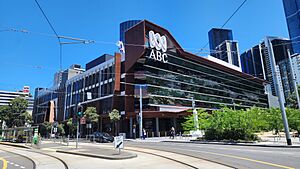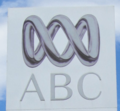Australian Broadcasting Corporation facts for kids
 |
|
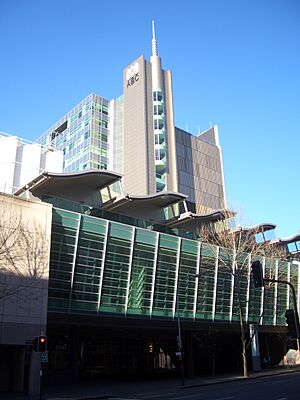
ABC headquarters in Ultimo
|
|
|
Formerly
|
Australian Broadcasting Commission (1932–1983) |
|---|---|
| Statutory corporation | |
| Industry | Mass media |
| Predecessors |
|
| Founded | 1 July 1932 |
| Founder | Lyons government |
| Headquarters | ABC Ultimo Centre,
Sydney
,
Australia
|
|
Area served
|
Australia, Worldwide |
|
Key people
|
|
| Products |
|
| Services |
|
|
Operating income
|
$100.363 million (2024) |
| –$2.205 million (2024) | |
| Total assets | $1.953 billion (2024) |
| Total equity | $1.169 billion (2024) |
| Owner | Australian Government |
|
Number of employees
|
4,682 (2024) |
| Divisions |
|
The Australian Broadcasting Corporation (ABC) is Australia's main public broadcaster. It gets most of its money from the Australian government. A special board chosen by the government manages the ABC. It is an independent organisation, meaning it makes its own decisions about what to broadcast. The ABC also earns some money from its commercial division, ABC Commercial.
The ABC started as the Australian Broadcasting Commission on July 1, 1932. It took over from a private company called the Australian Broadcasting Company. The ABC was created to be independent from the government. It was first funded by fees people paid to have a radio. But this didn't work well because Australia has a small population and a very large area. So, in 1949, the government decided to fund the ABC directly with taxpayer money. In 1983, its name changed to the Australian Broadcasting Corporation.
The ABC offers radio, television, online, and mobile services across Australia. ABC Radio has four national networks and many local stations. ABC Television runs five free channels and the ABC iview streaming service. All news and current affairs are made by the ABC News team.
The ABC's postal address in every Australian capital city is PO Box 9994. This is a special tribute to Australian cricketer Sir Donald Bradman, who had a record-breaking batting average of 99.94.
Contents
How the ABC Started and Grew
Early Days of Australian Broadcasting
Before the ABC, different radio stations started in Australian cities from 1924. The government created a system where some stations got funding. In 1928, the government took over these stations. They hired a private company, the Australian Broadcasting Company, to provide programs.
But people thought the government shouldn't run the broadcasting service directly. So, on July 1, 1932, the Australian Broadcasting Commission (ABC) was created. It took over the Australian Broadcasting Company and the national radio service.
The ABC soon got the nickname "Aunty," similar to how the BBC in Britain was called. The ABC was set up like the BBC, and many of its early programs came from the BBC.
ABC's Growth: 1950s to 2000s
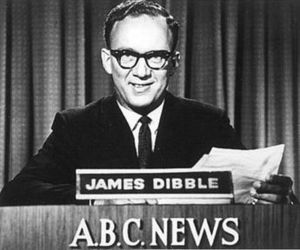
The ABC started television broadcasts in 1956. The first TV station, ABN-2 in Sydney, began on November 5, 1956. Early TV news had to be sent by special machines to each city. Then, it was prepared and read separately in each place. In 1975, colour television came to Australia. Soon after, the ABC started using satellites to send programs across the country.
In 1975, the ABC launched a 24-hour rock radio station in Sydney called 2JJ. This station later became the national Triple J network. A year later, a national classical music network, ABC Classic FM, started.
The ABC faced budget cuts from 1976 until 1998. The biggest cuts happened between 1985 and 1996.
In 1983, the organisation's name officially changed to the Australian Broadcasting Corporation. Even though the government owns and funds it, the ABC is independent in its news and programs. This independence is protected by the 1983 law.
Live TV broadcasts of some parliamentary sessions began in 1990. By the early 1990s, most ABC radio and TV stations were broadcasting 24 hours a day.
In 1991, the ABC helped launch the popular children's music group The Wiggles. Also, the ABC's Sydney radio and orchestra teams moved to a new building, the ABC Ultimo Centre. In Melbourne, the ABC Southbank Centre was finished in 1994.
The children's TV series Bananas in Pyjamas first aired in 1992.
An international TV service, ABC Australia, started in 1993. At the same time, Radio Australia reached more countries.
The ABC website was launched in August 1995.
ABC in the 2000s and 2010s
In 2001, digital television began. The ABC's online division was renamed "ABC New Media."
In 2008, ABC TV was rebranded as ABC1. A new channel for children, ABC3, was announced. Also, a new online streaming service called ABC iview launched.
ABC News 24, a 24-hour news channel, started on July 22, 2010. It is now known as ABC News. In 2014, ABC1 went back to its original name, ABC TV.
In November 2014, the ABC's funding was cut by $254 million over five years. This meant the ABC had to reduce its staff by about 400 people. Some regional and local programs were cut to focus on national programs.
In 2017, ABC News 24 and other news services were brought together under one ABC News brand.
Between 2017 and 2018, the ABC changed how it was organised. Instead of separate TV and radio divisions, teams now create different types of content for TV, radio, and online.
In 2019, Ita Buttrose became the new chair of the ABC, and David Anderson became the managing director.
In June 2019, police searched the ABC headquarters. They were looking for articles from 2017 about alleged misconduct by Australian special forces. The ABC fought this in court, and in October 2020, the case against the journalist was dropped.
ABC in the 2020s
In June 2020, the ABC announced it needed to cut 229 jobs and some programs. This was due to a freeze on its budget. However, the total number of staff only slightly decreased because the ABC also hired new people.
In June 2021, the ABC announced plans to move about 300 staff to offices in Parramatta by 2025. This move aims to reduce costs and earn more money from renting out space in the city centre.
In December 2021, the ABC announced it would create more than 50 new jobs in regional Australia. This was thanks to new agreements with digital platforms.
In May 2024, the ABC started moving from its Ultimo office to the new Parramatta office. The first program from the new Parramatta studio was ABC Radio Sydney Mornings.
ABC's Famous Logo
The ABC logo is one of the most recognised symbols in Australia. In the early days of television, the ABC used special wavy patterns called Lissajous curves as screen fillers between programs.
In 1965, ABC graphics designer Bill Kennard created the current logo. He based it on a Lissajous curve, which is a pattern made by electronic signals on a screen called an oscilloscope. He added the letters "ABC" to the design, and it became the official logo.
In 1974, the logo got its first update. The lines were made thicker, and colour was added. In 2002, for its 70th anniversary, the ABC used a new silver 3D version of the logo. However, the classic 1974 logo was brought back in 2014. The silver 2002 logo is no longer used.
How the ABC is Managed
The ABC is managed by a board of directors. This board includes a managing director and five to seven other directors. The managing director is chosen by the board for up to five years. The rules for choosing directors are in the Australian Broadcasting Corporation Act 1983.
Sometimes, people have criticised the government's choices for the ABC Board. They have worried that some chosen members might be too close to political parties.
Since 2013, the government has used a system to choose board members based on their skills. However, the final decision is still made by the Communications Minister.
As of January 2025, the board members include:
| Name | Role | Start of term | Notes |
|---|---|---|---|
| Kim Williams | Chair | March 7, 2024 | Term ends March 6, 2029 |
| Hugh Marks | Managing Director | March 10, 2025 | Term ends March 9, 2030 |
| Laura Tingle | Staff-elected director | May 1, 2023 | Term ends April 30, 2028 |
| Nicolette Maury | Director | October 16, 2023 | Term ends October 15, 2028 |
| Georgie Somerset | Deputy Chair | February 23, 2017 | Term ends February 22, 2027 |
| Louise McElvogue | Director | October 16, 2023 | Term ends October 15, 2028 |
| Mario D'Orazio | Director | May 13, 2021 | Term ends May 12, 2026 |
| Katrina Sedgwick | Director | October 2, 2024 | Term ends October 1, 2029 |
How the ABC is Funded
The Australian government mainly funds the ABC. It also gets some money from its commercial activities and shops. The ABC's funding plan is reviewed every three years.
History of Funding
In the 1920s, some radio stations were funded by listener fees. Listeners would buy a radio and then pay a subscription to keep listening. This system continued until 1928, when the government took over these stations.
In 1932, when the ABC was created, it was funded directly by listener fees. But in 1948, the government changed this. The ABC started getting its money directly from the federal government.
From 1956 to 1974, people needed a combined licence for both TV and radio.
End of Licence Fees
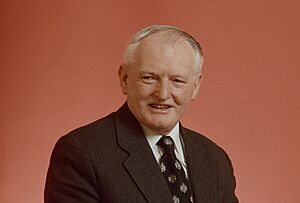
On September 18, 1974, the government stopped the licence fees. They believed that everyone should pay for the service through general taxes, not through a fee that was harder for poorer people to afford. It was also too expensive to check if everyone was paying the fees.
Some people were unhappy about this change, especially those who had already paid their annual fees. There were also rumours in 1976 that the TV licence fee might be brought back, but this did not happen.
In 2014, the ABC had to deal with $254 million in budget cuts. In 2018, the government paused the increase of the ABC's operating funding. This saved the government $83.7 million over three years. Even with these cuts, the ABC's financial data shows that government funding has increased over time when you account for inflation.
In 2023, the ABC moved to a five-year funding term instead of three years. This was a promise made by the Labor government.
People often say "where your 8 cents a day goes" when talking about the ABC. This phrase started in the late 1980s. It means that the ABC's services cost each person in Australia about 8 cents a day.
ABC Services
Radio Services
The ABC runs 54 local radio stations. It also has four national networks and an international service called Radio Australia. In 2002, DiG Radio launched on digital platforms, later becoming Double J. It also led to stations like ABC Country and ABC Jazz.
ABC Local Radio is the main radio station in each area. Each of the 54 stations has local entertainment, news, talk shows, music, and sports. They also broadcast some national programs.
As of June 2021, the ABC operates 15 radio networks. You can listen to them on AM, FM, digital platforms, and the internet.
- Radio National – This station, also known as RN, broadcasts over 60 different programs each week. Topics include music, comedy, science, health, arts, and current affairs.
- ABC NewsRadio – This is a 24/7 news service. It broadcasts federal parliament meetings and news updates every 15 minutes. It includes news from the ABC and other international news services.
- ABC Classic – This station plays classical music. It also features some jazz and world music. It was the ABC's first FM radio service.
- Triple J – This network is for young people aged 18–35. It focuses on alternative and independent music, especially from Australian artists.
The ABC also has several stations only available online and on digital platforms:
- ABC Classic 2 – This station plays music by Australian classical artists. You can only stream it online.
- Double J – This is a sister station to Triple J, for an older audience.
- Triple J Unearthed – This station plays music from new and independent Australian artists.
- Triple j Hottest – This station plays songs from the past 30 years of the Triple J Hottest 100 countdowns.
- ABC Jazz – This station plays jazz music from Australia and around the world.
- ABC Country – This station plays country music, mostly Australian.
- ABC Grandstand – This merged with ABC Sport in November 2020.
- ABC Extra – A temporary station for special events.
- ABC Kids – This station has programs for children, linked to the ABC Kids television channel.
There is also ABC Radio Australia, the ABC's international radio station.
ABC Listen App
The ABC Radio app launched in 2012. In September 2017, it was replaced by the ABC Listen app. This new app includes 45 ABC radio stations and audio networks.
Television Channels
The ABC operates five national television channels:
- ABC TV – This is the ABC's main TV channel. It shows comedy, drama, documentaries, and news. Each state and territory has a local news bulletin at 7 pm every night.
- ABC Family – This channel, launched in 2005, shows comedy and some repeats from ABC TV. It broadcasts from 7:30 pm to around 3 am. It shares its time with the ABC Kids block.
- ABC Entertains – This channel started on December 4, 2009. It broadcasts from 6 am to around 10 pm on weekdays. It has a wide range of programs for young people aged 6–15, especially 8–12 year olds.
- ABC Kids – This is a block of children's programs for ages 0 to 5. It broadcasts during ABC Family's downtime, from 4 am to 7:30 pm daily.
- ABC News – This is a 24-hour news channel. It features news from ABC News and Current Affairs, programs from BBC World News, and coverage of Parliament.
The ABC Television network has eight state and territory stations. Each is in its capital city and supported by smaller repeaters:
These stations also show local programs, like state news and sometimes live sports.
There is also ABC Australia, the ABC's international TV service.
Online and Digital Services
ABC Online is the name for the ABC's online services. This includes many websites for ABC News, TV channels, and ABC radio. It also offers podcasts, mobile apps, and streaming videos through ABC iView.
ABC Online officially launched on August 14, 1995. It was responsible for developing the ABC's web content. At first, it used funding from TV and radio, but later got its own budget. The ABC provided live online election coverage for the first time in 1996.
ABC TV Plus, a digital-only free-to-air TV channel, launched on March 7, 2005, as ABC2. It was able to broadcast comedy, drama, news, sport, and entertainment programs.
The ABC started its first podcasts in December 2004. By mid-2006, the ABC was a leader in podcasting, with many programs and thousands of downloads each week.
In December 2019, a new ABC homepage was launched. ABC News is one of Australia's largest and most visited websites. It has been a top-ranked website in Australia for many years.
In June 2023, the ABC announced a five-year plan. It will focus more resources on improving and promoting its digital platforms, rather than just radio and television.
International Services
ABC International manages the ABC's operations outside Australia. This includes Radio Australia, the Asia-Pacific TV channel ABC Australia, and its ABC International Development (ABCID) branch.
ABC Australia is an international satellite TV service. It is funded by advertising and government grants. It broadcasts English-language programs, including entertainment, sport, and news, to the Asia-Pacific region.
Radio Australia is an international radio service. It broadcasts to South-East Asia and the Pacific Islands. It offers programs in different languages, including Mandarin, Indonesian, Vietnamese, Khmer, and Tok Pisin.
ABC International Development (ABCID) helps promote good journalism and works with local media in the region. It provides training and support to partner organisations.
Independence and Fairness
The Australian Broadcasting Corporation Act 1983 states that the ABC Board must "maintain the independence and integrity of the Corporation." It also says that the ABC's news and information must be "accurate and impartial."
The ABC's rules on fairness mean it should not take sides. It is committed to basic democratic principles like freedom of speech and fairness for everyone. The ABC aims for "a balance that follows the weight of evidence" and gives "opportunities over time for principal relevant perspectives" to be heard.
The ABC also aims to show a wide range of topics and viewpoints. This means presenting different experiences and ideas. However, it does not mean that every opinion gets equal time.
ABC Commercial Activities
ABC Commercial is the business part of the ABC. It started in 1974 to market products related to the ABC's activities. Its goal is to create and sell high-quality products that connect with the ABC's work.
ABC Commercial includes ABC Music, a leading independent record label. It also has ABC Events, which organises concerts. It handles publishing and licensing for ABC Books, ABC Audio, and ABC Magazines.
The ABC Shop Online and in-store ABC Centres closed at the end of 2018. In early 2019, ABC Commercial became an independent business unit within the ABC.
In the financial year 2018–2019, ABC Commercial made a profit of $4.4 million. This money was used to create more content for the ABC.
ABC Studios and Media Production also hires out some of the ABC's studios and sound stages. These are in Sydney, Melbourne, Adelaide, and Perth.
ABC Orchestras
Before 1935, all music on the ABC was performed live. So, the ABC created orchestras in each state. They also had choruses and dance bands. This became the ABC Concert Music Division.
In 1997, the ABC separated its orchestras into different companies. These companies worked with a service company called Symphony Australia. On January 1, 2007, the orchestras became fully independent companies. The six state orchestras are:
- Adelaide Symphony Orchestra
- Melbourne Symphony Orchestra
- Queensland Symphony Orchestra
- Sydney Symphony Orchestra
- Tasmanian Symphony Orchestra
- West Australian Symphony Orchestra
ABC Friends Groups
ABC Friends are independent groups in each state and territory. They are part of a national organisation called ABC Friends National Inc., started in 2016. The first groups formed in 1976. Citizens created them because they were worried about government cuts to the ABC's budget.
The main goals of ABC Friends National are:
- To make sure the ABC gets enough funding to continue its important role as a national public broadcaster.
- To ensure the ABC remains independent from government and commercial interests.
Images for kids
See also
 In Spanish: Australian Broadcasting Corporation para niños
In Spanish: Australian Broadcasting Corporation para niños
 | Lonnie Johnson |
 | Granville Woods |
 | Lewis Howard Latimer |
 | James West |


